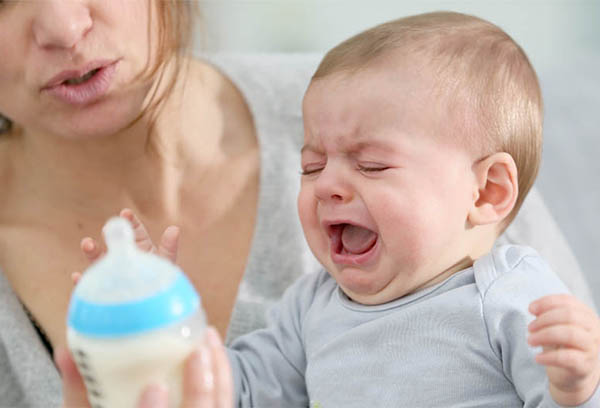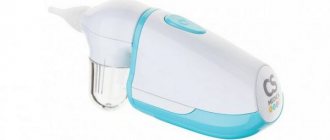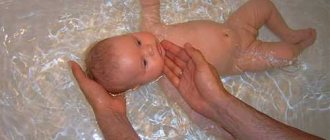Home › Child under one year old › Diseases
Author of the article
Ekaterina Rakitina Doctor Dietrich Bonhoeffer Klinikum, Germany
Reading time: 5 minutes
AA
Article last updated: 02/13/2019
Mixed nutrition is a method of combined feeding of children up to one year old, accompanied by the addition of special mixtures to the diet in an amount of up to 50 percent of the food consumed, the rest being mother's breast milk. If the amount of infant formula in the diet when feeding is more than indicated, then this option is closer to artificial nutrition.
The process of transferring to a mixed diet should be carried out under the supervision of a pediatrician. In addition to generally accepted administration regimens, your baby may need an individual approach.
This option for feeding newborns is preferable to completely abandoning breastfeeding. The reason for the choice may be the following circumstances:
- lack of natural food, which is reflected in too little weight gain for the baby (less than 250 grams in two weeks);
- maternal illness, due to which lactation is reduced, but feeding is acceptable;
- if the mother works and the baby does not have enough expressed milk during her absence;
- the newborn suffers from a disease (exudative diathesis, lactose deficiency) that requires restrictions in natural feeding;
- if a Rh conflict occurs with the mother, the need for artificial supplementary feeding may arise from birth;
- born twins or triplets need a combined diet, since there will not be enough natural food for each in the required volume;
- difficult birth and treatment of the mother.
It happens that the combination is a temporary measure and later a return to exclusive breastfeeding occurs.
Symptoms of constipation in newborns
Symptoms of constipation in infants appear almost immediately.
- Difficulty trying to defecate . The baby pushes for a long time, blushes, and often begins to cry;
- Rare bowel movements . If a child does not walk “at large” for more than a day and at the same time experiences obvious discomfort, then he probably has constipation;
- if the baby still manages to go to the toilet, then his feces are released in very small quantities and have a very hard consistency ;
- loss of appetite;
- nausea or vomiting;
- bloating and abdominal pain;
- sleep disorders.
Constipation can occur in infants who are breastfed and in those who are fed formula.
If, when feeding with mother's milk, the baby's intestinal function can recover on its own, then with artificial feeding, the use of additional means to combat constipation is often required.
How constipation manifests itself
It is traditionally believed that the absence of feces in a child during the day is already a signal of a disturbance in the intestines. However, we should not forget that for infants the indicators are very flexible. There are several factors to consider before drawing any conclusions.
Constipation in a mixed-fed baby manifests itself as follows:
- The consistency of stool is different from the norm - it is not soft enough.
- Redness and inflammation in the anal area. Even if redness and irritation appear during regular hygiene procedures, you should consult a doctor, because this may indicate the appearance of microcracks.
- The baby's behavior changes. If he screams and cries a lot, flails his legs, and constantly tries to push, then something is wrong and action needs to be taken.
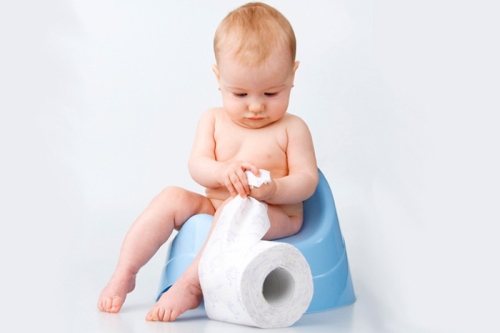
If the child does not have a bowel movement for more than a day, the mother should pay attention to this
Safe laxative options for newborns
Before using remedies to combat constipation in an artificial baby, you need to make sure that the diagnosis is correct. To do this, it is recommended to visit a pediatrician, describe the symptoms to him and let him examine the baby.
Only after a diagnosis can you begin to fight constipation in your baby.
ethnoscience
Many mothers do not trust modern medications that help normalize intestinal function in a bottle-fed baby. In this case, long-proven methods from traditional medicine will come to the rescue. But it should be remembered that before using any remedy indicated in the article, you must consult with a qualified pediatrician.
Chamomile decoction
One of the most effective and fast-acting methods of combating constipation in infants is an enema with chamomile infusion. To carry out this procedure you will need to perform the following steps:
- Boil the syringe thoroughly in a suitable container . It is best to use special small enemas with a soft spout with a volume of 50 ml for infants. They will cause babies a minimum of discomfort during insertion.
- Prepare a decoction of chamomile , the collections of which are sold in pharmacies. Cool it to 30 degrees.
- Remove the syringe from the water and completely squeeze out any boiling water that might remain inside.
- Fill the enema with a decoction.
- Place the baby on a clean diaper on his back or side, bending his knees .
- Lubricate the enema spout with a soft cream or Vaseline to minimize discomfort for the baby during administration.
- Gently insert the enema nozzle into the baby's butt , press the syringe and wait until all the liquid comes out of it.
- Take out the enema and with your free hand squeeze the baby’s butt for about half a minute so that the solution does not spill back.
The decoction is effective for several hours after administration, which means that the baby’s intestinal function will soon return to normal.
Vegetable oil and Vaseline
But the introduction of vegetable oil or Vaseline will also help to safely ease the process of bowel movements in an infant.
To do this, the required amount of oil (no more than 15 ml in volume) is drawn into a pipette, after which it is gradually introduced into the child’s bottom.
In this case, Vaseline or vegetable oil has a lubricating effect, facilitating easier and painless removal of feces from the body.
Dill water
If a baby's constipation is accompanied by stomach colic, then you can cope with the problem with the help of dill water . You can prepare this remedy yourself by boiling dill seeds (1 teaspoon of seeds per glass of water) or purchase it at a pharmacy. Dill water is given to babies before each feeding, following the dosage:
- infants up to 2 months 1–2 teaspoons;
- from 3 months to 3 teaspoons;
- from 4 months to six months, 2–3 tablespoons;
- from six months the dosage can reach a quarter glass.
This product not only helps remove gases and normalize the baby’s intestines, but also has an antibacterial effect. If the specified dosage is observed, dill water is completely safe for children, except in cases of individual intolerance.
Signs of constipation
During the first months, the baby may have bowel movements after every meal. Upon reaching six months, the amount decreases to 1-3 times a day. When breastfeeding, a baby may not have a bowel movement for several days. The fact itself should not cause concern among parents: the phenomenon is often observed with good absorption of mother's milk.
It is necessary to monitor the baby’s condition; the following signs should alert you:
- Hardness, lumpy stool. Normally they should be mushy;
- Straining, redness of the face, groaning during bowel movements;
- During or immediately after bowel movement, the baby becomes capricious and cries due to pain;
- Increased gas formation, the tummy becomes inflated and hard, often accompanied by colic;
- Decreased baby activity;
- Refusal to feed.
If there are no such symptoms, the child is active, eats well, is not capricious, and the tummy is soft, then there is no need to use a laxative.
Less commonly, constipation occurs as a result of diseases of the digestive system, lactose intolerance, metabolic disorders and enzyme production. In these cases, problems with bowel movements are chronic and accompanied by other symptoms of systemic disorders.
Laxatives are contraindicated for some serious diseases, so eliminating the problem requires consulting a doctor.
If the baby is breastfed
When a baby naturally feeds on mother's milk, constipation is possible for the following reasons:
- Lack of fluid. Normally, the baby should only have enough breast milk, but at high ambient temperatures it is necessary to supplement it with clean water, having first boiled and cooled it. This is especially necessary if there is dry air in the room in summer or winter due to heating appliances.
- Poor nutrition of the mother, abuse of fortifying foods: bread, processed foods, thick broth, rice.
- Taking medications by mother or baby. The effect can be caused by antibacterial, painkillers, sedatives, and drugs containing iron.
- Insufficient production of breast milk causes a lack of fluid and malnutrition in the baby.
To prevent constipation in a baby, the mother needs to follow a nursing diet and be careful when using medications - most of them are contraindicated during lactation. Laxatives for infants can be replaced by adding dried fruits and vegetable fiber to the mother’s diet.
Constipation in babies on IV
Difficulty defecating with screaming and crying is often the reason for using artificial milk formula instead of breastfeeding. It is rarely possible to immediately choose the appropriate food that will be well absorbed by the child’s body. Artificial formulas are often enriched with vitamins, casein, minerals, and lactose for the full development of the baby. The reaction to supplements is individual and does not depend on the cost of food.
Often, delayed bowel movements in children on IV are caused by a lack of fluid in the diet; supplementing with warm boiled water helps solve the problem. The absence of bowel movements is also observed with dysbacteriosis, which is characteristic of artificial animals. The disease is accompanied by painful bloating, changes in consistency and stool. In this case, taking a laxative is a one-time measure that will not solve the problem.
For bottle-fed babies, a remedy for constipation is selected after determining the reasons. In case of dysbacteriosis, the doctor prescribes medications that restore the intestinal microflora. If the effect of therapy is weak, try another milk formula, and, if necessary, prescribe a mild laxative.
Laxative for mixed-fed children
If there is a lack of breast milk or other circumstances, it becomes necessary to supplement the baby with artificial formula. New food can be well absorbed by the digestive system, but cause allergies. As a result of the selection of the mixture, the body experiences stress and constipation occurs.
If possible, it is necessary to reduce the amount of artificial nutrition as much as possible, increasing the consumption of breast milk. If there is a deficiency, measures must be taken to improve lactation.
Products for first complementary foods can have a reinforcing effect. They are episodic in nature; a single dose of a laxative helps eliminate the problem. It is important to introduce complementary foods gradually and ensure sufficient fluid intake for better absorption of food.
Modern drugs
Medicines in tablet form are contraindicated for children under 1 year of age; there is a list of laxatives suitable for children.
Rectal suppositories
They have a local effect and do not affect the entire body. When used, they help soften stool and facilitate its gentle elimination, stimulating intestinal motility. Laxative suppositories for newborns are made on the basis of glycerin and can be used from the first week of life. This method is used in extreme cases; its systematic use can cause addiction and disrupt the natural function of bowel movements.
Children's enema
Microenema Microlax has a softer and faster effect compared to candles. The soft tube with a tip is easy to use, the effect occurs within 20 minutes after administration of the solution.
Prelax
Syrup based on lactulose, which is harmless to the body, can be given to a child from an early age. It promotes the development of beneficial microflora, fluid retention in the intestines, and stimulates peristalsis. The effect is noticeable one to two hours after administration.
Duphalac
Duphalac in the form of syrup, produced on the basis of whey, is suitable for children from birth. The action is aimed at normalizing intestinal function, improving microflora and stimulating its contractions. The result appears on the first day after use. Flatulence may occur, which will subside within a few days.
Normolakt
A laxative in liquid form containing lactulose. It is used in a course, starting with a large dose, gradually reducing the amount.
Tea
Laxative tea for newborns, can be bought at the pharmacy. The composition includes herbs: chamomile, fennel, thyme. It has a laxative effect and improves digestion. The weak, cooled infusion should be given to the child from a spoon; the effect occurs within a day.
You need to find out which drug is suitable for the baby from the pediatrician - he will take into account the baby’s condition and prescribe a treatment regimen. You can independently choose a remedy for constipation in emergency cases; if they occur regularly, you need to consult a doctor to find out the reasons. When purchasing, you need to make sure that the product can be used for newborns; be sure to read the instructions before use.
What medications can be used in infants for constipation?
It is not recommended to give babies any medications without consulting a doctor. Even the safest drugs approved for use from birth can harm the immature intestinal microflora of a child. Therefore, only in extreme cases is it recommended to use medications to cure constipation in infants.
- It is best to use preparations containing lactulose. This is the safest laxative. Lactulose syrup is a prebiotic. It stimulates the production of beneficial bacteria in the intestines and helps remove feces. The following drugs containing lactulose are recommended: Duphalac, Normaze, Portalak, Lizalak and some others. To begin with, it is better to give these medications in a reduced dosage. And if you need long-term use, you should definitely consult your doctor.
- To reduce gas formation in the intestines, doctors prescribe the following drugs to children: Espumisan, Plantex or Sub-Simplex. They help relieve cramps and gently remove gases, relieving bloating.
- Komarovsky considers glycerin suppositories to be the best remedy for constipation in infants. Children's ones are very rarely sold on sale, but regular ones can also be used. One candle needs to be cut in half lengthwise and then crosswise. You will get four parts. You need to smooth out all the edges of one piece of candle with clean hands and carefully insert it into the baby’s anus. Gently squeeze his buttocks and hold for a while. This suppository will help soften stool and gently move it out.
Similar article - Celandine and Macleay ointment
Folk recipes
At home, you can try proven folk remedies, but it is better to coordinate them with your pediatrician
Prune decoction
Rinse 100 g of seedless dried fruits well, add a glass of water, boil for 7-8 minutes and cool. Some parents add sugar, but this is not necessary: the product has a pleasant taste even without sweeteners. The decoction is given to drink within 30 minutes. before feeding, 1 tsp is enough.
Dill water
Pour a teaspoon of seeds into a glass of water and cook for about 5 minutes. After cooling, give by spoon throughout the day. The product stimulates intestinal motility, reduces gas formation, and alleviates colic.
Enema
Enema with chamomile decoction, 100 ml of infusion is enough for the procedure. The method is not recommended to be used without consulting a doctor.
It is important to monitor the baby’s condition; if there is an individual intolerance, a rash and redness may appear. If you have an allergic reaction, you should stop taking it and consult a doctor.
It is not recommended to use laxatives without a pediatrician's prescription. It is unsafe to abuse them: it interferes with the natural formation of normal digestion. The action of laxatives is aimed at combating symptoms; to get rid of constipation, you need to find out and eliminate the causes of their formation.
ogrudnichke.ru
When you can't do without laxatives
The bowel function of a newborn is unstable. Therefore, without the help of a pediatrician, it is difficult to understand when a child suffers from constipation and when a reduction in the frequency of bowel movements is a natural physiological process of a developing organism. Note:
- on stool frequency;
- the smell and color of feces;
- on its consistency;
- on the child's behavior during bowel movements.

Signs of constipation in breastfed newborns:
- The child does not have bowel movements for 1.5–2 days or more. Normally, a newborn up to four months old has bowel movements 2 to 4 times a day.
- The child screams and is capricious while trying to defecate.
- The baby's behavior becomes restless - he often strains, cries, and straining does not produce results.
- The consistency of stool is hard, it has the appearance of peas, or its first portion resembles a cork, and after that the mass comes out in the form of a paste.
- The intestines do not empty completely.
- The baby sleeps restlessly.
- Refuses food.
- Gases do not leave the intestines.
- The abdomen is swollen and hard.
- The child cries for no reason and pulls his knees to his chest.
- Regurgitation and vomiting.
Retention of stool occurs more often in artificial babies than in infants fed breast milk. A bottle-fed baby has bowel movements less often. To understand whether your child is actually constipated, consider not only the frequency of bowel movements, but also the child's behavior.
Constipation is considered a condition if artificial:
- does not poop for more than three days;
- refuses food;
- sleeps restlessly;
- cries and blushes when trying to defecate;
- his stomach is tense.
When a child rarely copes well, but his stool is not dry and the baby does not strain too much when defecating, then he does not have constipation.
After comparing all the described signs and making your own conclusion about constipation in a small child, contact your pediatrician. After all, the cause of stool retention in a child can be a number of dangerous diseases. Don't try to deal with this on your own, even if your methods are safe and effective. When stool retention is associated with a serious illness, unproven treatments can worsen the situation.
Why does constipation develop?
Many factors can provoke bowel dysfunction in a child, and it can be difficult for parents to guess what the real reason is. The table describes options in which a mixed-fed baby may experience constipation.
| Cause | Explanation |
| Wrong diet | The problem can overtake you if your child’s meals are too rare or, conversely, too frequent. |
| Inappropriate mixture | It is not always possible to choose the right milk formula the first time. If a child experiences allergic reactions, constipation and other manifestations of disruption of the body’s functioning, the formula must be changed immediately! |
| Lack of fluid | Children who grow up exclusively on breast milk do not need to be supplemented before introducing their first complementary foods. However, with mixed feeding, the child must drink water, otherwise it will lead to dehydration. |
| Mom's poor diet | Do not forget that even with mixed feeding, mother's breast milk plays a fundamental role. During lactation, a woman needs to strictly monitor her diet so that the wrong diet does not affect the baby! |
Requirements for laxatives for newborns
Laxatives for newborns should be safe. All drugs are divided into two categories:
- Means that are taken orally: suspensions, powders, drops.
- Rectal medications: enemas, suppositories and microenemas.
The best laxative should have the following properties:
- efficiency;
- safety;
- softness of action;
- no side effects;
- availability;
- the composition is harmless - it does not lead to allergies and poisoning;
- ease of use, convenient dosage;
- no further addiction.
The drug should not cause “lazy bowel” syndrome, when a child, after taking the drug, loses the natural ability to have bowel movements without assistance.
To find out which laxative your newborn can use, talk to your doctor. Do not use any means, even the safest ones, unless prescribed.
Constipation remedies for newborns
Dosage forms of children's laxatives from 0 to one year:
- candles;
- solutions;
- syrups;
- drops;
- microenemas.
Pediatricians advise using Glycelax rectal suppositories to provide emergency care to a baby. They act locally, do not affect the functioning of other systems and organs of the baby, and do not lead to side effects if used once.
Solutions and syrups also make bowel movements easier. Select medications only taking into account the doctor’s opinion and in accordance with the child’s age. Read the instructions for medications before giving them to your child.
Microlax microenema has become a popular alternative to suppositories. This drug is injected into the baby's rectum, does not cause discomfort, and acts quickly and gently.
If you experience constipation in the first weeks of a baby’s life, do not panic, since his body is just beginning to adapt to new living conditions and gets used to nutrition.
The use of anti-constipation medications is only an emergency aid and will not eliminate the cause of stool retention. If stool retention occurs rarely and the medication goes away after use, then you don’t have to worry. And if stool is regularly delayed and you have to frequently use a laxative, then the child needs to be examined urgently.
Rectal suppositories
Not all laxative suppositories are allowed to be given to children from birth. Many of them are designed for children from three to six months.
Glycerin suppositories
The safest and most effective suppositories against constipation in children under one year of age are suppositories with glycerin Glycelax. The active ingredient is glycerol. The principle of action of the drug:
- not absorbed through the intestinal mucosa, does not enter the blood;
- irritates the intestines;
- softens feces due to the fat base;
- ensures quick and painless excretion of feces.
Glycerin suppositories for constipated infants are prescribed from 3 months. They are suitable for symptomatic therapy. To solve the problem of stool retention in babies under 3 months using suppositories, you will need to consult a doctor.
List of contraindications:
- personal intolerance to substances included in the drug;
- inflammation in the intestinal area;
- intestinal obstruction.
Suppositories are used rectally - by insertion into the rectum. Dosage: 1 children's suppository per day. A laxative effect is expected 10 minutes after the product dissolves. Rarely does a candle come out in liquid form without producing the expected result. The introduction of a second suppository is allowed no earlier than 12 hours later.
Sea buckthorn candles
Suppositories based on sea buckthorn oil do not have a pronounced laxative effect. They gently soften feces due to the fats included in the composition. Suppositories are suitable for the prevention or additional treatment of stool retention if there is inflammation in the intestines.
Sea buckthorn remedies have the following effects:
- mild laxative effect;
- relieving inflammation;
- healing of wounds and cracks in the anus;
- weak local anesthesia.
Dosage: one suppository per day.
Contraindications:
- drug intolerance;
- the presence of open wounds and bleeding in the intestinal area.
The laxative effect is expected 30 minutes after the suppository dissolves.
Mode of application
- Wash your baby's hands and rectal area.
- Before inserting a candle taken from the refrigerator, warm it a little in your hand.
- Raise the baby's legs and carefully insert the suppository into the intestine.
- Squeeze your buttocks to prevent the product from falling out.
- Once your baby has had a bowel movement, thoroughly wash the skin around his anus to prevent irritation.
Microlax
Advantages of Microlax enema for newborns:
- soft action;
- the product “works” only in the rectum and does not penetrate into the blood;
- feces quickly liquefy and are excreted without pain;
- ease of use;
- no side effects.
Dosage: one tube per day.
Method of use:
- open the microenema;
- lubricate its tip with a drop of product;
- gently insert into the anus;
- quickly squeeze out the contents of the tube;
- remove the tip;
- Give the baby a gentle abdominal massage and wait for the drug to take effect.
The laxative effect occurs 15 minutes after administration. Microenema has no contraindications.
Products for internal use
Laxative syrups and drops are safe for newborns, but their effect is not as fast as that of rectal products. The laxative effect occurs at least 12 hours after administration.
Duphalac is a popular anti-constipation remedy for babies, consisting of lactulose. The substance is made from natural whey. The syrup is indicated for use by babies from birth. A laxative effect is expected within 24 hours.
Side effects: flatulence may develop upon first use. It does not require treatment and goes away on its own after 1–2 days. Use a gas tube to relieve constipation in your newborn.
Duphalac for newborns for constipation provides:
- mild softening of stool and increasing its volume;
- removal of feces;
- stabilization of intestinal function;
- normalization of microflora.
List of contraindications:
- galactosemia;
- intestinal obstruction;
- lactose intolerance.
Dosage: 5 ml of the drug per day.
Analogues of Duphalac are Prelax and Normalakt. The products are used to treat and prevent childhood constipation.
Discuss the choice of laxative for infants with your pediatrician. Remember that all the remedies described solve the problem of one day, and do not treat the cause of the disease. Therefore, if stool retention recurs regularly, the child will need to be examined in the hospital.
What to do if your newborn is constipated

If your newborn has difficulty defecating, he needs help going to the toilet. Parents for constipation in infants use laxatives, folk remedies (dill water), abdominal massage, warm bath, enema. Before choosing treatment for constipation on your own, you should definitely consult with your pediatrician. The first thing experienced doctors recommend is external stimulation: the “bicycle” exercise and the “lying on your stomach” position for several minutes.
- A product that protects against cancer has been named
- Creamy spaghetti sauce
- 10 advantages of old age that not everyone knows about
Tummy massage
For colic, lack of gas, delayed bowel movements and other symptoms of constipation, the newborn should be given a massage. Light manipulations on the baby's tummy will help to regulate the release of accumulated gases and stimulate intestinal motility. Elements of a 5-minute session, which are done for constipation in infants and for its prevention:
- Place the newborn on his back, make 10 stroking circular movements clockwise.
- Using the edge of your palm, massage along the path of the letter “P,” applying light pressure at each point.
- From the navel, make several intense spiral movements with an open palm.
- Do circular rubbing with your fingertips along the path of the letter “P”.
- Turn the newborn onto his tummy, stroke in a circular motion from the scapular to the sacral area clockwise.
Candles for babies
Anti-constipation suppositories for infants are glycerin-based and gas-forming. The former, for any signs of constipation, help thick feces become soft, and the latter, dissolving, turn into carbon dioxide, which helps the baby to defecate on his own. Using this type of candles is safe for the baby’s health, because they have no side effects. However, their uncontrolled use can irritate the rectum, so it is better to use this method infrequently.
Enema for newborns

If the baby has chronic constipation, the doctor may prescribe a cleansing enema. Children of different ages need different amounts of fluid to cleanse the intestines of feces:
- from birth to one month of age – 35 ml;
- from two months to three months of age – 55 ml;
- up to six months – 85 ml;
- up to ten months of age – 120 ml;
- up to one year – 170 ml.
Boiled water, chamomile decoction or a weak salt solution are used as a cleansing liquid. Volume is measured using a pear or measuring cup. In addition to the liquid and a disinfected pear, the procedure will require: Vaseline oil, a tip, and a thermometer to determine the temperature of the liquid (36 degrees). Place the baby on your left side, and pull the bent legs towards the tummy. Then the tip, lubricated with oil, should be inserted 3 cm into the anus, then very carefully send the liquid there. After 2-5 minutes, the child should be placed on the potty.
Laxative for infants
A baby under one year of age should be given a laxative very rarely, so that the intestines do not get used to working only with the help of stimulation. They produce medications for constipation for young children in various forms, but pediatricians recommend using syrups, which are sold in all pharmacies without a prescription. As a rule, the active ingredient in laxatives is lactulose, which has a positive effect on intestinal microflora and improves peristalsis. The effect of using a laxative for constipation in infants appears within the first hour.
Expert opinion
Pediatricians consider lactulose as the best drug for treating constipation in children from birth. The safety of drugs is determined by their over-the-counter availability and frequency of use in pediatric practice.
Advantages of lactulose-based drugs:
- pleasant taste for children;
- lack of toxic effects;
- excellent tolerability by newborns;
- are not addictive;
- suitable for long-term treatment.
Experts warn that due to the intensive proliferation of bacteria in the child’s intestines, excessive formation of gases begins. Therefore, you need to start therapy with small doses, gradually increasing them.
Review of approved remedies for constipation in infants according to Komarovsky
A doctor can determine drug treatment for an infant up to one year after preliminary tests and instrumental examination of the digestive tract. Komarovsky strongly advises against self-medicating constipation.
When treating infants, one should focus on the safety of the drugs, natural composition, and the absence of contraindications for the baby to take medications. The pleasant taste of the drug for constipation is especially important for children over 6 months of age.
Pharmacy drugs
The course of treatment with medications in infants depends on the severity of disorders in the body, the cause of development and duration of constipation.
Similar article - Causes of fever in children
Dr. Komarovsky recommends safe medications for the treatment of constipation in infants:
| Name of the drug | Mechanism of action | Mode of application |
| Lactulose-based syrup (Duphalac, Normaze) | Softens feces in infants, stimulates gas formation and intestinal motility. | In the morning after eating, the child is given an age-appropriate dose to drink, which can be pre-mixed with breast milk or water. The course of treatment does not exceed 3-5 days. |
The effect of eliminating constipation is expected within 1-2 days.
Komarovsky points out the importance of visiting a pediatrician if bowel movements do not occur.
Komarovsky clarifies that if used infrequently, addiction may occur - it will be difficult for the baby to go to the toilet without additional stimulation.
Dr. Komarovsky recommends a combination of establishing nutrition, water regime and, if necessary, stimulation with drugs.
Folk remedies
Traditional medicine recipes against constipation include ensuring a sufficient amount of fluid, adding herbal decoctions and berries with laxative properties to the diet of the mother and child. Komarovsky recommends using home recipes carefully to avoid allergies in infants and bowel problems in nursing mothers.
The following folk remedies are often used for infants:
- eating dried fruits to replenish potassium deficiency - raisins, prunes, dried apricots, figs;
- drink a laxative decoction of dried fruits and an uzvar of apples and pears, compotes of raspberries and black currants.
Komarovsky recommends that in order to avoid the development of constipation in an infant, the mother should eat properly and select adapted formulas in the absence of breast milk. It is necessary to consult a doctor in a timely manner in order to minimize drug interventions in treatment.
Article last updated: 05/01/2019
What is constipation? This is difficult, irregular or incomplete bowel movement. Constipation in children under one year of age occurs quite often, which brings suffering to the baby and his parents. The main signs of constipation in newborns are infrequent bowel movements, hard stool, blood in the stool, or the baby's unsuccessful attempts to poop.
The occurrence of such problems with bowel movements should definitely lead parents to the idea of visiting a pediatrician. If there is blood in the stool, you should seek professional medical help immediately and call an ambulance!
Frequently asked questions from moms
Which remedies are better: suppositories, microenemas or drops?
The choice of remedy depends on the nature of the baby's constipation. If you need to urgently help your child with bowel movements, it is better to choose rectal medications: suppositories or enemas. And for the treatment of long-term constipation, drops or syrups with lactulose and prebiotics are suitable.
How often to give a laxative to a newborn?
Frequent use of laxatives is prohibited. Many remedies appear to be safe. But they are addictive. The child may develop lazy bowel syndrome. Use suppositories and microenemas for no longer than three days in a row. And lactulose syrups are taken for a course of no longer than two weeks.
How should a nursing mother eat so that her baby does not get constipated?
When breastfeeding, pay attention to drinking enough water. Add to your diet:
- porridge: oatmeal, buckwheat, wheat;
- lean meat, boiled or baked;
- fish;
- vegetables;
- dried fruits;
- fermented milk products.
Mom can drink beet juice for constipation, but just don’t give it to the baby. Among the home remedies for constipation, a small dose of vegetable oil can be given to a newborn.
Avoid fatty foods, strong tea, flour and sweets.
Drug treatment of constipation in newborns
The main point when treating constipation in a baby is his safety. When choosing a remedy for constipation for a newborn, you should not forget about the following:
- Before treating constipation, you need to make sure that the baby really has problems with bowel movements. Sometimes, for example, when changing nutrition from breastfeeding to artificial or mixed, a child may experience stool retention, which does not require treatment, but is an individual feature of the intestines. If in doubt, you should consult your doctor.
- It is prohibited to use systemic laxatives taken orally for newborns unless they have been prescribed by a specialist.
- You cannot use various folk remedies. Often, the baby’s parents begin to resort to artificial stimulation of the baby’s rectum with the tip of a syringe, or place homemade candles made from laundry soap or other means in the baby’s rectum, which, in their opinion, should relieve the baby of constipation. Such actions can lead to injury to the rectum or irritation of its mucous membrane.
- If a baby does not have bowel movements for 1-2 days, and at the same time gases do not leave the intestines, you should urgently contact a specialist. This situation can occur in case of intestinal obstruction, when urgent medical attention is required.
Laxative medications may:
- To combine water particles, which leads to an increase in the volume of intestinal contents - bulk laxatives.
- Cause irritation of the intestinal walls, which leads to increased peristalsis - irritating laxatives.
- Prevent the absorption of salts in the intestine, which leads to an increase in the volume of intestinal contents - osmotic or saline laxatives.
- Laxative oils and prebiotics (dietary fiber) are also used.
Children under two years of age should not be prescribed osmotic or saline or oil laxatives. Products that are absorbed into the blood (in whole or in part) are not used.
For children over two years of age, such drugs can only be used under the supervision of a specialist.
Safe laxatives include:
- Medicines that are not absorbed in the intestines and do not have a systemic effect on the body.
- Medicines that do not affect the absorption of salts in the intestines, as this is dangerous for the baby.
- Medicines that have a mild effect.
A mixed-fed baby should definitely be encouraged to drink more fluids. You can top it up with plain water from a spoon or bottle. From time to time you can replace water with decoctions of dried fruits. You can cook compotes from apricots, apples, plums, pears and other fruits that are well tolerated by the baby, but do not sweeten the drink.
If natural methods of normalizing digestion (correcting the diet, physical activity) do not help, then most likely there is impaired motor skills and spasms. With spasms, the passage of gas is difficult, so constipation is accompanied by intestinal colic. The most common cause of such pain is the air that the baby swallows when feeding or crying.
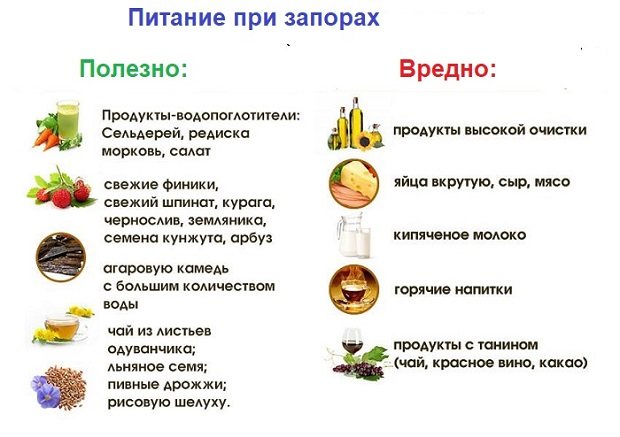
The occurrence of colic in a baby is not affected in any way by the mother's diet (with natural feeding) or formula. Pain occurs in 70% of infants, regardless of whether they are fed regular formula, lactose-free or adapted, or breast milk. How to help a child, what does a pediatrician recommend for colic and constipation in newborns? Most likely, these will not be medications.
Every day you need to give the baby a massage (stroking the tummy with fan movements strictly clockwise), carry the baby in an upright position more often (not only after eating), use a sling or a special backpack from time to time (this is a preventative measure not only for hip dysplasia, but also some movement).
To relieve pain, you can give your child dill water or fennel. Many pediatricians today are completely convinced that there are no special remedies for colic in newborns, but there is a large list of drugs that will, to some extent, help relieve pain and reduce gas formation. These are medications that contain simethicone or fennel fruit.
There is no need to remember specific names. A pharmacist in any pharmacy will offer a range of products. You can choose the cheapest or “attractive”. There is no significant difference between these medications. They work the same, have almost the same composition, and are safe for babies.
Glycerin softens dense stool so that it can be removed normally from the baby’s body. The substance is not absorbed into the blood, but acts exclusively locally. The medicinal effect occurs within thirteen minutes. Microclysters "Microlax" are easy to administer, restore water balance in the intestines, and improve the functioning of the digestive system. Microlax copes with constipation in ten to fifteen minutes.
One of the most famous laxatives is Duphalac. It is safe to give this medicine to a newborn who is constipated. The syrup costs from 500 rubles, but you can buy not a large bottle, but a portioned sachet. When lactulose enters the intestines, it softens stool, saturates it with liquid, and contracts the intestinal walls. Duphalac helps with constipation in a newborn within 12-24 hours.
Treatment of constipation in a newborn baby with mixed feeding is based on an integrated approach. This means that you should not immediately run to the pharmacy to buy medications. It is necessary to consult a doctor who will conduct a diagnosis and, as a first step, will most likely recommend trying to eliminate errors in the diet of both the baby and the mother, paying attention to the diet and physical activity of the baby.
Your local pediatrician will help you choose the right mixture. He will also tell you how to prepare artificial nutrition, in what proportions to dilute the dry concentrate, how often to give the child the formula and in what volume. Overfeeding also leads to constipation, so there is no need to force the newborn to eat the cooked portion to the end.
The volume of liquid consumed by the child during the day is of great importance. Its deficiency provokes disorders of the food digestion process - water is absorbed from the intestinal lumen into the surrounding tissues. As a result, feces become dense, decrease in volume and do not have a mechanical effect on the intestinal wall, which leads to a decrease in its motility.
Gymnastic exercises and abdominal massage will help improve the functioning of the digestive tract, strengthen intestinal motility, and speed up the movement of feces. The procedures are carried out during periods when the baby is awake between meals or before feeding. The duration of such gymnastics is no more than 10 minutes. Exercises can be the following:
- placing the baby on his stomach;
- riding a gymnastic ball while lying on your stomach or back;
- swimming in a filled bath;
- performing the “bicycle” exercise;
- alternating stretching of the legs with pressing them to the stomach in a bent position.
A tummy massage involves stroking clockwise around the navel with light pressure. It is useful to alternate such movements with pressing your knees to your stomach.
If a newborn baby is constipated, the following actions should never be taken:
- often use an enema to relieve the condition, this will only worsen the situation, and constipation will become chronic;
- give laxatives that are not intended to relieve constipation in infants.
The need to eliminate constipation in a newborn
First, let's define what constipation is? Constipation is difficult, irregular, untimely or incomplete bowel movements.
If an adult does not have regular bowel movements, treatment is, of course, required. What about babies? Should you always worry?
If a child is breastfed or eats high-quality formula and feels well, gains weight, grows and develops, then he has the right to any appearance, color, frequency and consistency of bowel movements.
When breastfeeding, milk is completely absorbed and stool can be done once every two days. Let us repeat: if the child feels well, there is no reason to worry.
If a child is constipated and is restless, eats poorly, or feels unwell, we take action!
If your baby has constant problems with bowel movements, do not self-medicate; be sure to consult a doctor to make sure there are no serious reasons for concern.
In children of the first year of life, Hirschsprung's disease can become a serious and dangerous cause of constipation. Fortunately, it does not occur very often (one case per 2-5 thousand newborns).
How to help your child with constipation

A child at any age can experience intestinal problems, including schoolchildren and newborns. There are many reasons for intestinal obstruction: food allergies, nervous tension, poor diet, long-term use of medications, low fluid intake. Parents are especially concerned if the baby is constipated, because irregular bowel movements can lead to a dangerous disease - intestinal volvulus, when only surgical intervention by a surgeon can save the baby’s life.
Constipation in an infant is the absence of bowel movements for 24 hours. As a rule, newborns have bowel movements at least 2 times a day. If the child is on artificial nutrition, he has bowel movements once a day. The consistency of the stool should be soft. If the stool is very dense or absent altogether, then this is already considered constipation in the baby. To avoid the unpleasant consequences of such a child’s condition, parents should know how to help him.
When breastfeeding

- Vegetable stew with chicken
- Why is it better not to warm up the car engine in winter?
- What to do if pension savings are transferred without your knowledge
Constipation in breastfed newborns should concern new parents. The first thing you need to know: if your baby has bowel movements less than once a day or has difficulty defecating, accompanied by crying, bloating, refusal to eat and poor sleep, you need to sound the alarm. First you need to understand the causes of constipation:
- Colon defects (anatomical). This condition is called Hirschsprung's disease. A defect is extremely rare as a cause of constipation, but it is imperative to exclude the disease.
- Unbalanced nutrition of a nursing mother. Foods such as bananas, rice, white bread, coffee, cocoa, and nuts can cause constipation in a breastfeeding baby. Mom should eat more vegetables, which have a positive effect on the peristalsis of the baby.
- Abrupt introduction of complementary foods. A newborn’s gastrointestinal tract copes well with mother’s milk, but other products require getting used to. Pediatricians say that a baby should be fed only breast milk for at least six months.
- Use of antibiotics. When medications are the only way to cure a baby from a serious illness. As a result, constipation almost always occurs - this is how intestinal dysbiosis manifests itself.
Constipation in newborns with artificial feeding

The famous pediatrician Dr. Komarovsky publicly declares that the main treatment of constipation in children occurs due to too early a transition to artificial nutrition. The main reason is unnatural food high in additives and fatty acids. The baby’s gastrointestinal tract does not accept food that is difficult for him, as he is not adapted to it. There are a number of other reasons that can cause constipation in a baby:
- lack of fluid in the body;
- a sharp transition was made to artificial nutrition;
- frequent change of different mixtures.
With mixed feeding
Sometimes mixed nutrition is a necessary measure when the mother has a lack of milk or its quality is inappropriate. For some babies, complementary feeding is indicated even from the maternity hospital, when doctors recommend using additional milk nutrition. Even the highest quality formula can provoke changes in the functioning of the newborn’s digestive system. In addition to the main causes of constipation in infants, in mixed-fed babies, indigestion can occur due to overheating, dehydration, or large amounts of solid food.
What do you need to know before using laxatives?
What is suitable for an adult is not always suitable for a child, because any medicine has age categories.
The medicine you choose must meet the following requirements:
- Effectiveness. The time and duration of action of the drug must be known before using it.
- Safety. The laxative should have a mild effect on the intestines. It is better for newborns to avoid systemic drugs, which will help prevent unwanted side effects, because local drugs do not enter the bloodstream.
- Soft impact. After taking the medicine, bowel movements should not be intense or painful.
- Ease of use. The dosage and method of administration should be simple and understandable.
What medications are there for infants?
Laxatives for children in the first year of life are most often available in the form of:
- solutions;
- microenemas;
- syrups;
- candles.
Let's take a closer look at each type of these medications and find out how to use them.
Rectal suppositories for children from 0
As a rule, they do not enter the central bloodstream, but act locally, so they are relatively safe.
For example, suppositories with glycerin (Glycelax) can be used from the first days of a baby’s life. They do not contain harmful components, are effective and give quick results within half an hour. For newborns you need to take 1/8 of the suppository ; from a month and older you can double the dosage. But it’s better, of course, to look for those candles that are marked “for children”, then you won’t have to be tricky with the dosage, and mom will be calmer.
Their prices are quite affordable. So, for example, in Moscow they will cost you 125-182 rubles, in St. Petersburg from 102 - 141. The lowest price in Samara is 99-117 rubles, and in Khabarovsk the price range will be 128-175 rubles.
Microclysters
In pharmacies this type is represented by the drug Microlax. What he really is?
This is a ready-made viscous solution for microenemas. It contains sodium lauryl sulfoacetate, which has a thinning effect on the intestinal contents, sorbitol stimulates the flow of water, thereby enhancing the laxative effect, and glycerol has a positive effect on motility.
The drug has a high safety profile and works within 5-15 minutes . The price ranges from 229 to 869 rubles, depending on the quantity (4 or 12 pieces) and region of residence.
Syrups
Medicines containing lactulose. It is a disaccharide consisting of galactose and fructose. It has a hyperosmotic effect, i.e. retains fluid in the intestines, which leads to swelling of stool and, as a result, increases peristalsis.
But since lactulose stimulates the proliferation of bifidobacteria and lactobacilli, it can lead to increased gas formation, especially in the first days of use.
The manufacturer recommends starting with a higher dose and then stopping at a lower maintenance dose, but in this case it is better to increase the dose gradually to avoid colic and bloating.
Your doctor may advise you to take something extra.
What drugs are presented on the pharmacy market? This is the well-known Duphalac, as well as Normaze, Poslabin, Prelax, Portalak, Romphalac and others.
Some syrups have added auxiliary substances such as citric acid and flavorings. For kids, look for those that contain only lactulose and water.
In Moscow, the minimum cost for 200 ml will be 287 rubles, in St. Petersburg - 270, in Samara from 278, but a large bottle of 1000 ml will cost 700-800 rubles.
Methods for normalizing stool with drugs
First of all, you need to remember that you should never give your child medications on your own! All medications must be prescribed by a doctor and can only be used in accordance with the indicated doses.
Medical recommendations on what to do for constipation in a newborn with mixed feeding contain the following medications:
- Glycerin suppositories. The product, tested by many parents, always works flawlessly and does not harm the body of a small child - after all, the candles do not contain toxic substances and do not enter the stomach. Their effect occurs in a short time, which allows you to quickly and painlessly normalize stool.
- Lactulose syrup. This medication is one of the few that are approved for children from the first days of life. It is not only safe, but also has a positive effect on the body: lactulose syrup promotes the growth of beneficial bacteria and improves digestion. Despite the fact that the permitted dose for newborns is 5 ml, it is impossible to give such an amount to a child the first time. You need to increase your syrup intake gradually, because in case of an overdose there will be disturbances in the functioning of the digestive tract.

. The drugs described above are completely harmless to the body of a small child, but it is important to be careful. It is not worth giving your baby medications all the time - if they are used regularly, the body will begin to malfunction and will no longer be able to function normally without them.
It is impossible to allow addiction to medications in infancy!
ethnoscience
We won’t talk about “grandmother’s” methods, like laundry soap injected into the rectum. Why torture yourself and your baby? Instead, try the following before feeding:
- Lubricate the nipple with vegetable oil, you can repeat several times.
- If your baby is on IV, put a couple of drops of oil on his tongue and then feed him.
- Give dill water to drink.
To prepare it, pour a teaspoon of dill seeds with a glass of boiling water, leave and strain. For newborns - 1-2 teaspoons before and after feeding, at 2-3 months - 1-3 teaspoons, after 4 months - 2-3 tablespoons, after six months - ¼ cup. They will cost you 50-95 rubles.
The role of proper diet and movement
- If a breastfeeding baby is constipated, the mother may be eating something wrong. Check your diet. Did fried foods, sweets, sausages, and white bread appear in it?
Perhaps your diet contains a lot of refined foods: white rice, pasta, premium flour products. Add bran bread, beets, fresh vegetables and fruits to your diet that do not contribute to gas formation. Remember to drink enough water, at least 2 liters. - If the baby is on IV, this often leads to constipation. They can be provoked by a sudden transition to a new type of diet or frequent changes in milk formula.
Don't forget to give your baby a drink. After all, without water, feces become dry and dense. Give better raw, well-purified water for baby food, since boiled water does not contain mineral salts, including Potassium, which promotes good peristalsis. - Try a light massage , which will improve motor skills and the release of accumulated gases.
You can easily stroke the baby's tummy clockwise 5-10 times or alternately bend and straighten the legs at the knee joints. Place your baby on his tummy for 2-15 minutes before each feeding, depending on age.
As we have seen, there are many ways to help a baby. Don't panic, use safe medications intended for newborns, watch your diet and drinking regime, don't forget to consult your pediatrician and may your mornings always be easy!
bezgemorroya.com
Causes of constipation
- The main reason is the mixture containing a large amount of fatty acids and artificial additives. The stomach of a newborn is not yet adapted to digest such complex food. The digestion process is delayed, resulting in constipation.
- Also, constipation during mixed feeding can be caused by insufficient nutrition or, conversely, overfeeding.
- Too abrupt a transition to a new type of nutrition for a newborn. Using several mixtures from different manufacturers at once or changing them frequently can also cause constipation.
- It happens that the reason lies not in the complementary feeding itself, but in what the mother eats. If the mother's stool is disturbed, then most likely the child will have the same problem.
- Insufficient physical activity of the baby or muscle weakness.
- Dehydration interferes with the proper formation of feces. Dehydration can be caused by low fluid intake and temperature imbalance.
- Constipation can develop against the background of dysbiosis and other health problems. Treatment with antibiotics also provokes digestive disorders.
